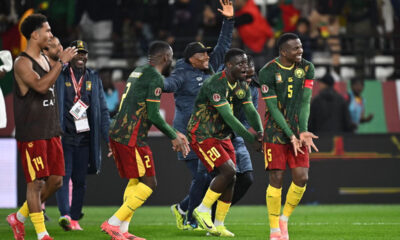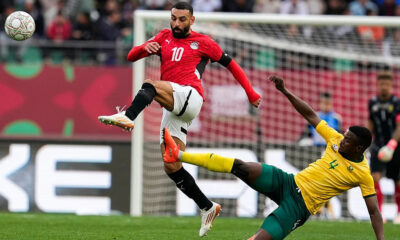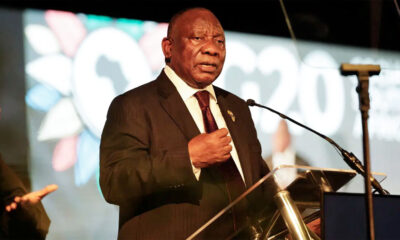Africa
South Africa’s Ramaphosa elected president
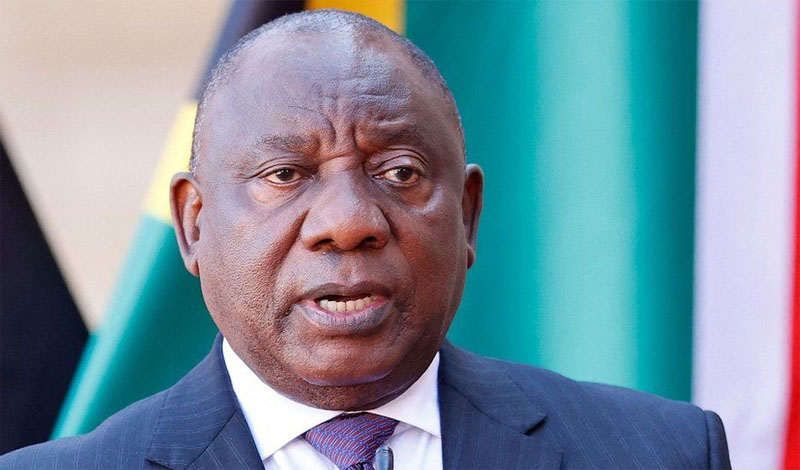
South Africa’s Ramaphosa elected president
Cape Town, South Africa – Late-night negotiations and an eleventh-hour agreement led to the formation of South Africa’s first-ever coalition government on Friday, with President Cyril Ramaphosa at its head.
The multiparty coalition signed its agreement only on Friday, as members of parliament were sworn in after marathon negotiations and back-and-forth calls between Ramaphosa and leaders of other parties.
Late Friday night, Ramaphosa was elected as the country’s president in parliament. Under the unprecedented coalition agreement, the Democratic Alliance (DA) – the African National Congress’s (ANC) official opposition until now – and the Inkatha Freedom Party (IFP) voted for an ANC president for the first time.
The multiparty coalition was prompted after the ANC suffered its worst electoral decline in 30 years. The party holds 159 of 400 seats in parliament – short of the 201 seats needed to have a majority – after winning 40 percent of the vote in the country’s May 29 election.
After days of internal talks within the ANC, Ramaphosa announced last week that the party would seek a “government of national unity”. But the left-leaning Economic Freedom Fighters (EFF) and former President Jacob Zuma’s uMkhonto weSizwe (MK Party) – which was created months before the election and ate into the ANC’s traditional voter support – refused to join the government, especially with the DA a part of it. The MK Party had also demanded Ramaphosa’s removal from the presidency.
The right-leaning DA, with 21 percent of the seats in parliament, will now be the ANC’s main partner in government with the support of the nationalist IFP. The parties agreed to an eight-page framework that will govern their unity government, including a clause stating that a decision could only be made if “sufficient consensus” was reached.
READ ALSO:
- Sudan’s army repels major assault on el-Fasher; kills RSF commander
- Supreme Court gun ruling stuns Las Vegas shooting survivors
- Tinubu’s June 12 fall: Humour, karma, compassion, By Farooq Kperogi
This means that Ramaphosa and the ANC will not be able to make decisions without buy-in from coalition partners. The parties agreed to 10 fundamental principles, which included respect for the constitution, and positions against racism and sexism.
In the agreement signed, the parties agreed that “rapid, inclusive and sustainable economic growth” would be the coalition government’s apex priority.
The ‘hard part’ starts now
Former DA leader and negotiating team member Tony Leon said that he had never imagined a world where the ANC and the DA would co-govern.
“The last time I negotiated with the ANC around the new constitution was in 1996, and they had 62 percent support,” he told Al Jazeera.
Leon described the talks since the May 29 vote as “very hard”, but said the president’s election was the “easy part”.
“The next five years are going to be difficult,” he said, adding that trust would make the coalition government functional.
Leon said talks were still incomplete five minutes before parliament’s sitting began on Friday at 10am local time (08:00 GMT).
“We agreed to outline a modality of how you get through today and some signals and signposts of the future. It is about some broad principles and important provisions; at the end of the day, this will not just depend on goodwill. It will depend on trust between the parties,” he said.
The agreement signed on Friday morning did not include details on which parties will occupy what positions in government. Ramaphosa has until Wednesday to determine that. He will be sworn in by the country’s chief justice next Wednesday.
According to the agreement signed, while Ramaphosa has the prerogative to appoint ministers and deputy ministers, he needs to consult leaders of other parties in the coalition before he does so.
Pierre de Vos, professor of constitutional law at the University of Cape Town, said he was wary about what a coalition government might mean for the country’s governance.
“It is difficult to be confident in what’s to come,” he said.
De Vos said that while a coalition government was “good on paper,” South Africa had a fractious society that the ANC kept together for three decades. “When it comes to difficult issues like inequality and racism, the two parties are polar opposite sides,” he said.
The DA has fought against race-based transformation policies, which the ANC has pushed for three decades.
Other analysts said they believe the coalition government would force ideological parties to the centre.
“This coalition agreement is a good thing. It will force the ANC away from the left to the centre and the DA away from the extreme right,” said political analyst JP Landman.
South Africa’s Ramaphosa elected president
Africa
Gabon Suspends Social Media Over False Information, Cyber Threats

Gabon Suspends Social Media Over False Information, Cyber Threats
The government of Gabon has ordered a nationwide suspension of social media platforms “until further notice,” citing the spread of false information, cyberbullying, and unauthorised sharing of personal data as threats to national security, social cohesion, and public order.
The announcement was made by the High Authority for Communication (HAC) in a televised address. HAC spokesperson Jean-Claude Mendome explained that the measure aims to curb the circulation of “inappropriate, defamatory, hateful, and insulting content”, which authorities believe have been fueling unrest and deepening social divisions.
While HAC did not specify which platforms would be immediately affected, widely used applications such as WhatsApp, Facebook, TikTok, and Instagram are expected to be included in the restrictions. By Wednesday, several users reported that Facebook and TikTok were already inaccessible, indicating the government may begin enforcement imminently.
READ ALSO:
- BREAKING: Academic Activities Halted as ASUU Resumes Strike
- Ramadan Health Tips: Six Ways to Stay Hydrated While Fasting
- Tinubu Urges Senate to Confirm Yusuf for NAHCON, Marafa for INEC
The suspension comes amid a sensitive political and social period in Gabon. The country has been undergoing a transition since the 2023 military coup led by President Brice Oligui Nguema, who later won the 2024 presidential election with over 90% of the vote, ending more than five decades of Bongo family rule. Since taking office, Nguema promised reforms and a break from past practices, including allowing independent media to observe election processes — a departure from the use of internet blackouts by previous administrations.
Despite these reforms, the government faces growing social and economic pressures. Teachers launched strikes in December 2025 over unpaid salaries and worsening working conditions, and unrest has since spread to healthcare workers, civil servants, and other public-sector employees. These protests have heightened concerns over public order and digital misinformation, prompting the government’s move to restrict social media access.
Civil society groups and analysts have raised concerns about the impact of the suspension on freedom of expression, economic activity, and digital communication, noting that approximately 850,000 Gabonese actively rely on social media for business, news, and personal communication. The government, however, insists the action is a temporary security measure to prevent further destabilisation.
Observers say Gabon’s decision reflects a broader challenge across Africa, where governments attempt to balance cybersecurity, misinformation control, and digital freedoms. The coming days will test both the government’s resolve and the resilience of the country’s digital economy.
Gabon Suspends Social Media Over False Information, Cyber Threats
Africa
Ghana Moves to Extradite Russian Man Over Secret Sex Video Scandal

Ghana Moves to Extradite Russian Man Over Secret Sex Video Scandal
The Government of Ghana has announced plans to seek the extradition of a Russian man accused of secretly recording sexual encounters with several women and sharing the footage online without consent, describing the alleged acts as serious violations of cybersecurity, privacy, and women’s rights.
African and Russian media identified the suspect as a self-styled “pick-up artist” and online blogger in his 30s who travelled to Ghana and allegedly filmed intimate encounters without the knowledge of the women involved. Some reports claim he used sunglasses fitted with a hidden camera to record the encounters and later circulated the videos on social media platforms. Ghanaian authorities, however, said investigations are ongoing and have not officially confirmed the recording method.
Speaking to journalists, Ghana’s Minister for Communication, Digital Technology and Innovation, Sam George, said he had invited the Russian ambassador in Accra for discussions, stressing that the alleged actions violate Ghana’s cyber-security laws and would not be taken lightly.
He said preliminary findings by the Ministry of Gender, Children and Social Protection suggest the suspect has likely left Ghana, but emphasised that his departure does not reduce the seriousness of the alleged conduct or the government’s obligation to ensure accountability.
READ ALSO:
- Residents Flee as Gunmen Launch Fresh Attack on Kwara Community
- DSS Probes El-Rufai’s Claim of Toxic Chemical Import by Ribadu
- Senate Explains Why Real-Time E-Transmission Cannot Be Mandatory in 2027 Elections
According to the minister, Ghana will activate international cooperation mechanisms, including Interpol, to trace the suspect and seek the cooperation of Russia.
“We will activate every resource at our disposal, working with Interpol and Russian law enforcement. We want the gentleman brought back to Ghana to face the rigours of our law,” George said, adding that the government would still formally request extradition despite Russia’s long-standing policy of rarely extraditing its citizens.
He noted that Ghana may consider trying the suspect in absentia if he refuses to return to face prosecution.
Local media reports also indicate that the same individual may have been involved in similar illegal recordings in Kenya, raising concerns about multiple victims across different countries and the possibility of a broader pattern of abuse.
Under Ghana’s Cybersecurity Act, 2020, the non-consensual recording or distribution of intimate images or videos is a serious criminal offence, carrying penalties of up to 25 years in prison. Authorities say the law was enacted to address rising cases of online sexual abuse, revenge pornography, and digital exploitation, particularly targeting women and children.
Ghana has intensified enforcement of these laws in recent years. In 2022, a court sentenced Solomon Doga, a 22-year-old phone repairer, to 14 years in prison after he pleaded guilty to sharing nude images without consent in a sexual extortion case.
Officials say the current case underscores Ghana’s determination to protect digital privacy, public trust, and the dignity of women, as investigations into the Russian suspect continue.
Ghana Moves to Extradite Russian Man Over Secret Sex Video Scandal
Africa
Starvation Cult Preacher Faces Expanded Murder, Terrorism Charges in Kenya
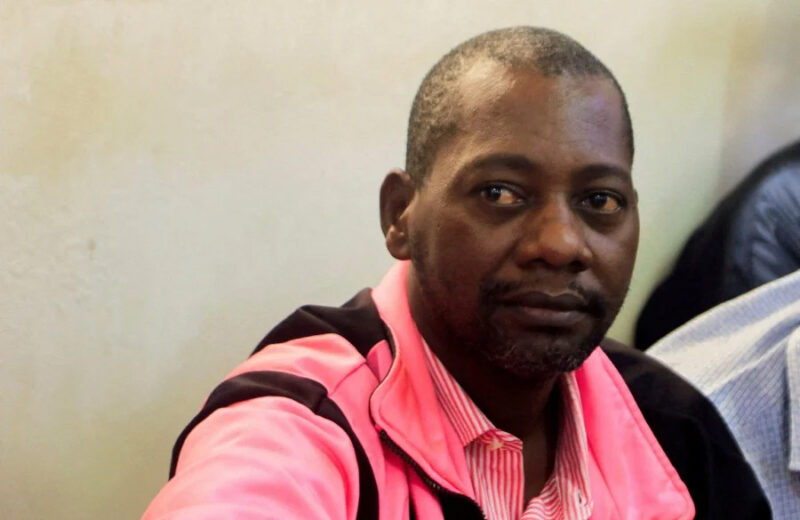
Starvation Cult Preacher Faces Expanded Murder, Terrorism Charges in Kenya
A Kenyan court has expanded charges against self‑proclaimed preacher Paul Nthenge Mackenzie and seven associates over the deaths of 52 more victims linked to the notorious Good News International Church starvation cult. The new charges come as part of ongoing investigations into one of the deadliest cult-related tragedies in Kenya.
Mackenzie, already facing trial in Mombasa for multiple counts of murder, manslaughter, and terrorism, appeared in court Wednesday with the seven co-accused. Prosecutors allege that even after his initial arrest in 2023, Mackenzie continued to influence followers through radical teachings, encouraging them to travel to Kwa Binzaro, where victims died from prolonged starvation.
Authorities say the additional 52 deaths occurred between January and July 2025, in shallow graves near Kwa Binzaro in Kilifi County. Prosecutors describe the group as a structured criminal sect, using extremist ideology to coerce followers into life-threatening practices. The defendants face charges including organized criminal activity, radicalization, and facilitating terrorism.
READ ALSO:
- Lagos Allocates 180 Shops to Displaced Alabarago Market Traders
- Cubana Chief Priest Vows to Oppose Peter Obi in 2027 Presidential Race
- US Lawmakers Introduce Bill to Sanction Kwankwaso, Miyetti Allah
All eight accused pleaded not guilty, and the next hearing is scheduled for March 4, 2026. Legal experts note that the expanded charges reflect the complexity of prosecuting cult-related killings and the ongoing effort to hold both leaders and their network accountable under Kenya’s legal system.
The Shakahola Forest case first drew global attention in 2023, when investigators discovered hundreds of bodies in shallow graves, following claims that Mackenzie had persuaded followers and children to starve themselves to “meet Jesus.” Over 400 victims were recovered from Shakahola, making it one of the worst cult-linked tragedies in modern Kenyan history.
Authorities warn that the expanded prosecution aims to dismantle the deadly network and prevent future tragedies, while sparking national debate about the regulation of fringe religious groups and doomsday cults in Kenya.
Starvation Cult Preacher Faces Expanded Murder, Terrorism Charges in Kenya
-

 News3 days ago
News3 days agoOsogbo Sons and Daughters Mark 5th Anniversary with Awards, Political Undertones
-

 News1 day ago
News1 day agoSaudi Arabia Confirms Sighting of Ramadan Crescent, Fasting Begins Wednesday
-

 metro2 days ago
metro2 days agoUS Freezes Assets of Eight Nigerians Over Boko Haram, ISIL, Cybercrime Links
-

 News21 hours ago
News21 hours agoRamadan Begins in Nigeria as Sultan Confirms Crescent Sighting
-

 metro22 hours ago
metro22 hours agoLagos Woman Shares Ordeal After Alleged Rape, Sparks Nationwide Outcry
-
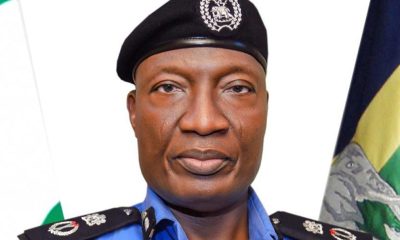
 Entertainment2 days ago
Entertainment2 days agoMystery in Lekki: Police Probe Death of Two Nollywood Crew Found Lifeless in Parked Car
-

 metro2 days ago
metro2 days agoTerror in Lagos Traffic: Cutlass Gang Unleashes Mayhem on Mile 12–Ketu Road
-
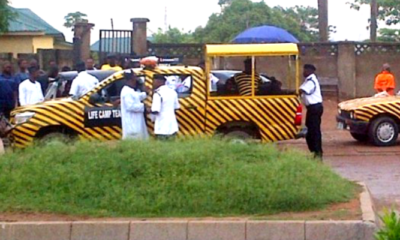
 Auto2 days ago
Auto2 days agoAppeal Court Ruling on VIO Limited to Abuja, Not Lagos — LASG





